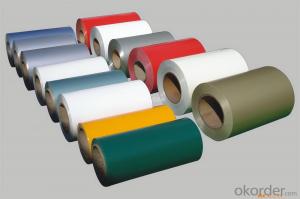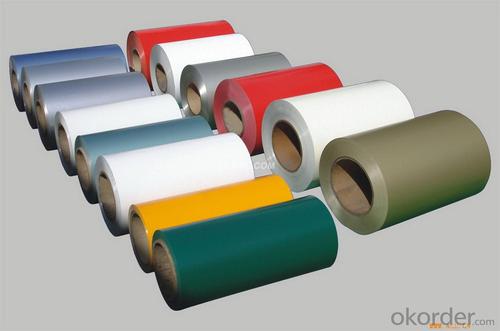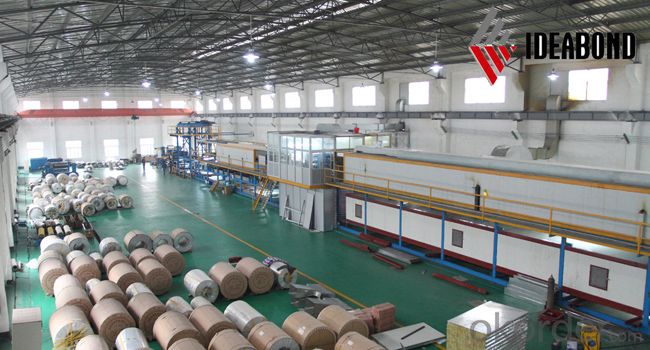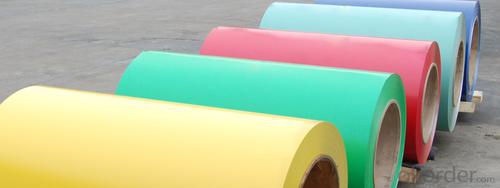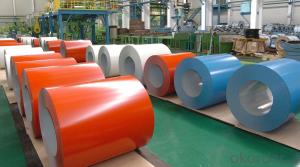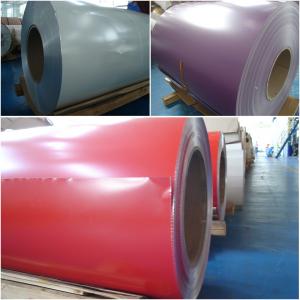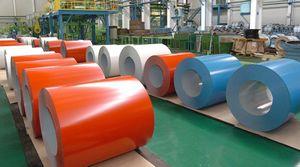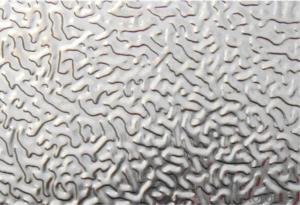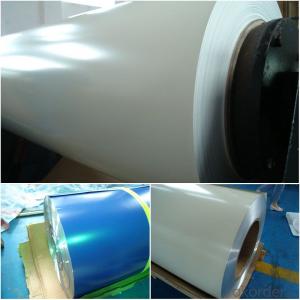Wholesale PVDF AA3105 Coated Stucco Embossed Aluminum Sheet Foil Coil
- Loading Port:
- Shanghai
- Payment Terms:
- TT OR LC
- Min Order Qty:
- 20 m.t.
- Supply Capability:
- 800000 m.t./month
OKorder Service Pledge
Quality Product, Order Online Tracking, Timely Delivery
OKorder Financial Service
Credit Rating, Credit Services, Credit Purchasing
You Might Also Like
supply Mill-finished / coated aluminum sheet/ coil:
Alloy: AA1050,1060,1100,1200,2024,3003,3304,3005,3015,5052,5086,5754,5083,6061,7050,7475,8011, etc
Temper: O, H14/16/18/22/24/32/ H112/H321/T6,T851,T7451,T7351, etc
Thickness: 0.02mm—20mm
Width: 100mm—2000mm (Can be slitted)
Notice: PE coating / PVDF coating / Embossment can be done if required.
- Q: How are aluminum coils used in the production of sporting goods?
- Sporting goods production relies heavily on aluminum coils because of their lightweight, durable, and corrosion-resistant properties. These coils are primarily employed in the manufacture of baseball bats, tennis rackets, golf clubs, and bicycle frames. A major advantage of aluminum coils is their lightweight nature, which allows for improved maneuverability and performance. For example, hollow barrels created using aluminum coils enhance swing speed and power in baseball bats. Similarly, in tennis rackets and golf clubs, aluminum coils are used to construct the shaft, providing players with better control and maneuverability during gameplay. The durability of aluminum coils ensures that sporting goods can endure intense physical activities. Whether it is the impact of a baseball striking a bat or the force exerted on a bicycle frame during a rough ride, aluminum coils offer the necessary strength and resilience to withstand such pressures. This durability is crucial in extending the lifespan of sporting goods, reducing the need for frequent repairs or replacements. Additionally, the corrosion-resistant properties of aluminum make it an ideal material for sporting equipment exposed to various weather conditions or moisture. Aluminum coils are resistant to rust, ensuring that sporting goods can maintain their performance and appearance over time. This quality is particularly advantageous in outdoor sports like golf or cycling, where exposure to rain, humidity, or perspiration is common. In conclusion, the extensive use of aluminum coils in the production of sporting goods is driven by their lightweight, durable, and corrosion-resistant properties. These coils contribute to the overall performance, strength, and longevity of sporting equipment, enhancing the experience of athletes and enthusiasts alike.
- Q: I have the Samp;W Mamp;P 15 rifle and was wondering if I should oil the exterior of the rifle. The receiver material is 7075 T6 Aluminum and the finish is Hard Coat Black Anodized (specifications on website). Any advice or tips are welcome! Thanks!
- Aluminium does not rust. The anodized finish protects the aluminium from oxidization. So no, oiling the finish is not necessary.
- Q: What industries commonly use aluminum coils?
- Several industries commonly use aluminum coils due to the many beneficial properties of aluminum. One of the largest consumers of aluminum coils is the automotive industry, where they are used in the manufacturing of various components such as radiators, condensers, and heat exchangers. The construction industry also extensively utilizes aluminum coils for applications like roofing, gutters, and siding due to their lightweight, corrosion-resistant, and durable nature. Aluminum coils are also widely used in the HVAC (heating, ventilation, and air conditioning) industry for the production of air handling units, heat pumps, and ductwork. The electrical industry utilizes aluminum coils in the production of transformers, as aluminum's high electrical conductivity makes it an excellent choice for these applications. Additionally, the packaging industry often employs aluminum coils for the production of cans, containers, and foils. Aluminum's ability to form a protective oxide layer and its excellent heat conductivity are particularly advantageous in packaging applications. Other industries that commonly use aluminum coils include aerospace, marine, and transportation, where their lightweight nature helps improve fuel efficiency and enhance performance. Overall, the versatility, durability, and excellent physical properties of aluminum make it a preferred choice of material for numerous industries that rely on aluminum coils for various applications.
- Q: Can aluminum coils be used for radiation shielding?
- Yes, aluminum coils can be used for radiation shielding. Aluminum is often used as a shielding material due to its high atomic number and excellent attenuation properties, which effectively block and absorb radiation. It is commonly used in various industries, including medical, nuclear, and aerospace, for shielding against different types of radiation such as X-rays and gamma rays.
- Q: How do aluminum coils contribute to sustainable manufacturing?
- Aluminum coils contribute significantly to sustainable manufacturing in various ways. Firstly, aluminum is a highly recyclable material, and the use of aluminum coils promotes a closed-loop recycling system. These coils can be easily melted down and reused without losing their original properties, reducing the need for new raw materials and minimizing the environmental impact of mining and extraction. Additionally, aluminum coils are lightweight, which reduces energy consumption during transportation. Their lightweight nature makes them more fuel-efficient to transport, resulting in lower greenhouse gas emissions. This not only reduces the carbon footprint but also saves costs associated with transportation. Moreover, aluminum has excellent corrosion resistance properties, which makes it durable and long-lasting. This durability reduces the need for frequent replacements, leading to less waste generation. It also extends the lifespan of products that use aluminum coils, reducing overall resource consumption and minimizing environmental strain. Furthermore, the use of aluminum coils in manufacturing processes promotes energy efficiency. Aluminum has high thermal conductivity, meaning it can efficiently transfer and dissipate heat, resulting in reduced energy consumption during various manufacturing operations. This energy efficiency translates into lower energy costs and reduced greenhouse gas emissions. Lastly, aluminum is non-toxic and does not release harmful substances during its lifecycle. This ensures the safety of workers, consumers, and the environment. The absence of toxic materials also simplifies the recycling process, making it easier and more environmentally friendly. In conclusion, aluminum coils contribute to sustainable manufacturing through their recyclability, lightweight nature, durability, energy efficiency, and non-toxic properties. By incorporating aluminum coils into manufacturing processes, companies can reduce their environmental impact, conserve resources, and promote a more sustainable future.
- Q: So i like eating frozen foods like wings or bagel bites and i cook them in my toaster oven with aluminum foil under them on top of the tray. I heard using aluminum is bad for you and can get you diseases or illnesses. Is this true and should i stop using aluminum foil? i eat these frozen foods maybe 3-4 times a week
- Aluminum foil melts at 660dF, hardly a temp reached by a toaster oven. For years, before microwaves, TV dinners were sold in aluminum trays.
- Q: What specific cleaning procedures should be followed for aluminum coils post-usage to ensure their longevity and functionality?
- <p>After using aluminum coils, it's important to clean them properly to maintain their performance and longevity. Typically, a mild detergent and warm water solution can be used to gently clean the coils. Avoid abrasive materials or harsh chemicals that could scratch the surface. Rinse thoroughly to remove all detergent residues. For stubborn residues, a soft cloth or sponge can be used. It's also crucial to dry the coils completely to prevent corrosion. Regular inspection and maintenance, including cleaning, will help extend the life of aluminum coils.</p>
- Q: This question asks for the method to measure the dimensions of an aluminum coil.
- <p>To measure the size of an aluminum coil, you'll need to measure its diameter, width, and thickness. Use a tape measure or a caliper to measure the coil's diameter and width. For the thickness, a micrometer or a coil thickness gauge can be used. Ensure the coil is laid flat and measure at several points to get an average thickness. If the coil is wound, you may need to unroll it partially to take accurate measurements. Always follow the manufacturer's guidelines for your specific measuring tools to ensure accuracy.</p>
- Q: Are aluminum coils suitable for electrical conductivity applications?
- Yes, aluminum coils are suitable for electrical conductivity applications. Aluminum is a good conductor of electricity, second only to copper in terms of conductivity. It is widely used in various electrical applications, including power transmission lines, electrical wiring, and electronic devices. Aluminum coils offer efficient electrical conductivity while being lightweight, cost-effective, and resistant to corrosion.
- Q: How are aluminum coils used in the production of battery enclosures?
- Aluminum coils are widely used in the production of battery enclosures due to their excellent properties. Firstly, aluminum is a lightweight material, making it ideal for creating lightweight battery enclosures, which is crucial for portable devices and electric vehicles where weight reduction is important. Additionally, aluminum coils can be easily formed into different shapes and sizes, allowing manufacturers to customize the battery enclosures to fit specific battery designs. This flexibility in shaping also helps to optimize space utilization and improve the overall efficiency of the battery system. Moreover, aluminum is highly resistant to corrosion, which is essential for battery enclosures as they are often exposed to harsh environments and chemicals. This corrosion resistance ensures the longevity and reliability of the battery enclosure, protecting the battery cells from damage and ensuring safe operation. Furthermore, aluminum has excellent thermal conductivity, allowing it to efficiently dissipate heat generated during the battery charging and discharging process. This is vital for preventing overheating and maintaining the optimal temperature range for battery performance. In conclusion, aluminum coils play a crucial role in the production of battery enclosures by providing lightweight, customizable, corrosion-resistant, and thermally conductive properties. These properties contribute to the overall efficiency, safety, and longevity of battery systems used in various applications such as consumer electronics, electric vehicles, and renewable energy storage.
Send your message to us
Wholesale PVDF AA3105 Coated Stucco Embossed Aluminum Sheet Foil Coil
- Loading Port:
- Shanghai
- Payment Terms:
- TT OR LC
- Min Order Qty:
- 20 m.t.
- Supply Capability:
- 800000 m.t./month
OKorder Service Pledge
Quality Product, Order Online Tracking, Timely Delivery
OKorder Financial Service
Credit Rating, Credit Services, Credit Purchasing
Similar products
Hot products
Hot Searches
Related keywords
